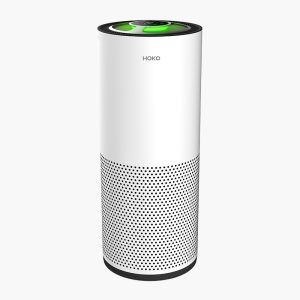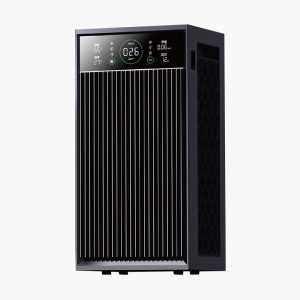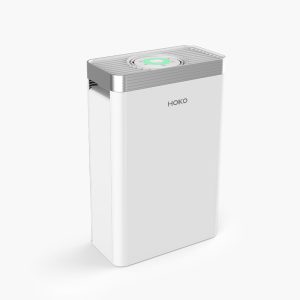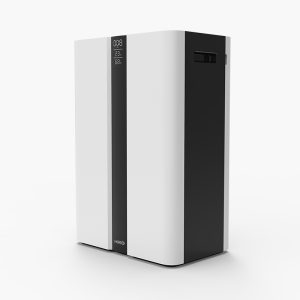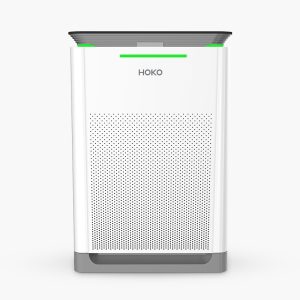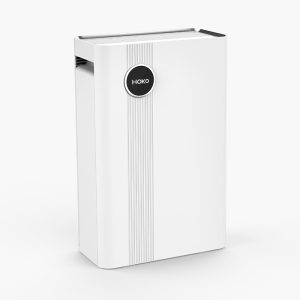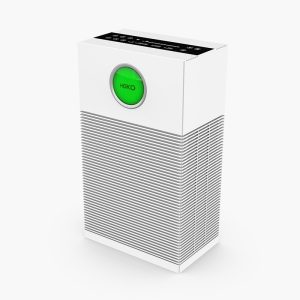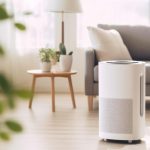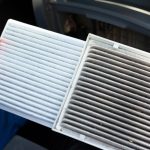Indoor air quality is an essential aspect of our overall well-being. Poor indoor air quality can result in various health issues, including allergies, asthma, and respiratory infections. One effective solution to improving indoor air quality is using a HEPA air purifier. In this article, we’ll delve into how HEPA air purifiers work, their benefits, and how to choose the right one for your needs.

HEPA air purifiers are here to save the day. These high-efficiency machines can improve indoor air quality and provide cleaner breathing environments. Let’s discuss what HEPA air purification is, its benefits, how it works, and potential drawbacks to help you make an informed decision on whether this solution is right for you. Keep reading to learn more about how HEPA air purifiers can enhance indoor air quality and transform your indoor space into a fresh and healthy environment!
What is a HEPA Air Purifier?
A HEPA air purifier manufacturer designs it to remove contaminants from the air inside your home. The term “HEPA home air purifiers” stands for High-Efficiency Particulate Air, which means that these filters are able to trap tiny particles in the air that other filters cannot.
HEPA filters work by using a dense web of fibers to capture airborne particles like dust, pollen, pet dander, and even bacteria and viruses. These fibers are typically made of glass or synthetic materials and are layered on top of each other to create an intricate filter system.
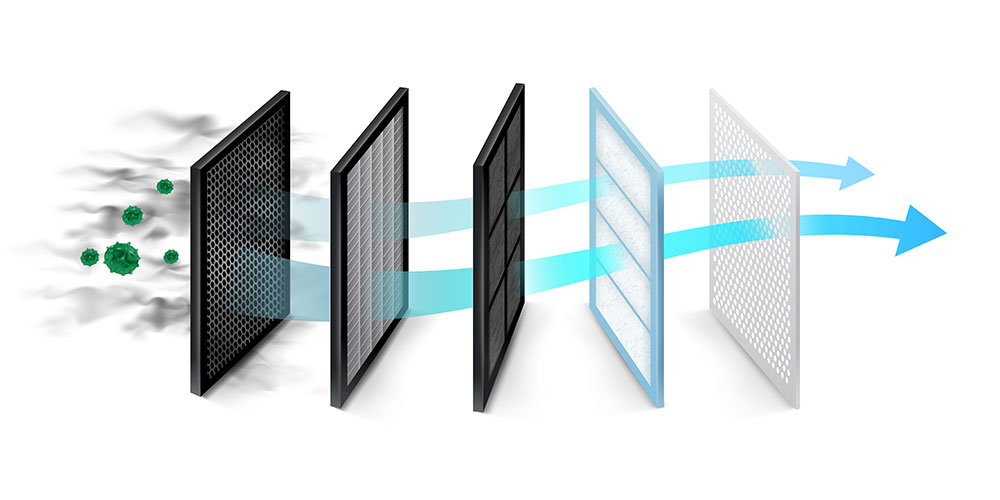
When you turn on a HEPA air purifier, it pulls in the surrounding air and passes it through its series of filters. As the filtered air is released back into your room, it’s cleaner and healthier for you to breathe.
One important thing to note about HEPA air purifiers is that they’re not all created equal. Some models may claim to be “HEPA-like” or use similar-sounding terms but don’t meet true HEPA standards. To ensure that you’re getting maximum filtration benefits, look for devices labeled as certified True HEPA.
Investing in a high-quality HEPA air purifier can make a significant difference in your indoor environment’s overall healthiness – so why wait? Breathe easier with this powerful tool!
HEPA filter
HEPA air purifiers are a great investment for anyone looking to improve their indoor air quality. With its advanced filtration system and ability to remove even the smallest particles from the air, it is no wonder that these portable air purifiers are becoming increasingly popular. Not only do they help with allergies and respiratory issues, but they also create a healthier environment overall.
When purchasing direct from HEPA air purifier manufacturers, be sure to look for one with high CADR (clean air delivery rate) ratings and consider the size of your room when selecting the appropriate model. Additionally, regular maintenance of your air filter itself will ensure optimal performance over time.
Investing in a HEPA air purifier can greatly benefit your health and provide peace of mind knowing that you are breathing cleaner air at home or in the office. So why not make this small change today? Your lungs (and those around you) will thank you!
How HEPA filters work
HEPA air purifiers are an effective way to improve indoor air quality. They work by trapping harmful particles and contaminants in a dense filter, preventing them from circulating back into the room. While there are many types of portable air- purifiers available on the market today, none can match the performance and efficiency of HEPA filters.
HEPA filters use advanced technology that is designed to remove even the smallest airborne particles from your home or office. By using a portable air cleaner using one of these devices, you can breathe easy knowing that your indoor air quality is being protected at all times.
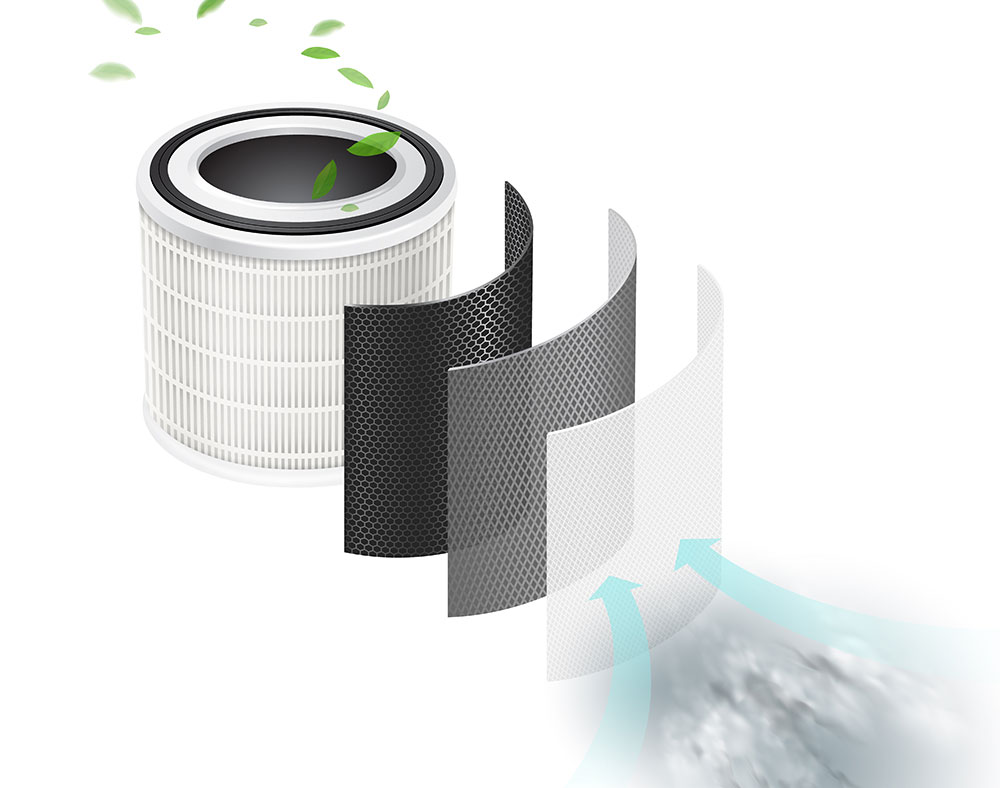
Whether you suffer from allergies or simply want to create a cleaner living environment for yourself and your family, investing in a HEPA air purifier is an excellent choice. With their proven ability to capture pollutants like dust, pet dander, pollen, and other irritants commonly found in indoor spaces; they truly represent the gold standard when it comes to improving indoor air quality!
Benefits of HEPA Air Purification
HEPA air purifiers are an excellent investment for people looking to improve their indoor air quality. These devices work by removing harmful pollutants and allergens from the air, leaving you with fresher and cleaner air to breathe.
One of the main benefits of HEPA filtration is that it can eliminate up to 99.97% of airborne particles as small as 0.3 microns in size! This includes common irritants like pet dander, dust mites, pollen, mold spores, and even bacteria and viruses.
Not only does this help reduce allergy symptoms, but it also helps prevent respiratory illnesses caused by poor indoor air quality. In fact, the U.S Environmental Protection Agency (EPA) recognizes that exposure to indoor pollutants can be up to five times higher than outdoor levels!

HEPA filter manufacturers make filters long-lasting and require minimal maintenance compared to other types of filtration systems. They typically need replacement every six months or so depending on usage.
Investing in a HEPA filter is a smart choice for anyone concerned about their health or simply wants better quality breathing space indoors. The benefits are clear- fresher-smelling homes free from irritating pollutants make life more enjoyable too!
Removing allergens
HEPA air purifiers are a great investment for improving the indoor air quality of any space. Their ability to capture and remove allergens, such as dust mites, pet dander, and pollen can greatly both improve air quality and the health and well-being of those who suffer from allergies or other respiratory issues.
By understanding how HEPA filters work and their benefits for air purification, you can make an informed decision on which HEPA air purifier is best suited for your needs. Regularly replacing the filter will ensure optimal performance and provide clean air for years to come.
Investing in a HEPA air purifier not only improves your physical health but also creates a more comfortable living environment by reducing odors caused by cooking or pets. With its ease of use and cost-effective nature compared to medical treatment costs related to respiratory issues, it’s clear why so many people rely on this technology today.
So don’t wait – take advantage of all that modern technology has to offer with a high-quality HEPA air purifier and start breathing easier today!
Reducing asthma and allergy symptoms
By reducing the number of allergens and pollutants in the air, HEPA air purifiers can significantly improve indoor and outdoor air in quality. This is especially beneficial for those who suffer from asthma or allergies as these conditions can be exacerbated by poor indoor air quality.
HEPA filter manufacturer makes filters to capture particles as small as 0.3 microns, which means they can effectively remove common household allergens from household air pollution such as dust mites, pollen, pet dander, and mold spores. By removing these irritants from the air, HEPA purifiers create a healthier environment that is less likely to trigger allergy or asthma symptoms.
In addition to filtering out most airborne pollutants and irritants, some HEPA purifiers also use activated carbon filters to remove odors and chemicals from the air. This makes them an excellent choice for people with chemical sensitivities or those living in areas with high pollution levels.
Investing in a HEPA air purifier is one of the most effective ways to improve indoor air quality and reduce allergy and asthma symptoms. With so many different models available on the market today, it’s easy to find one that fits your needs and budget. So why not take steps towards better breathing today?
Eliminating smoke and odors
HEPA air purifiers are a great investment for improving indoor air quality. Not only do they work by removing allergens and reducing asthma and allergy symptoms, but they also eliminate smoke and odors. With so many benefits, it’s no wonder that more and more people are turning to HEPA air purifiers to create a healthier living environment for themselves and their families. So if you’re looking for an effective way to improve the quality of your indoor air, consider investing in a HEPA air purifier today!
Protecting against viruses and bacteria
By removing up to 99.97% of harmful particles from the air, HEPA air purifiers provide a powerful tool for improving indoor and outdoor air in quality and promoting better health. They are particularly valuable for those who suffer from allergies or respiratory issues, as well as anyone looking to create a cleaner environment in their home or workplace.
One additional benefit of HEPA filtration is that it can help protect against viruses and bacteria. By trapping airborne contaminants and preventing them from circulating through the air, HEPA filters reduce the risk of illness transmission, making them an important addition to any infection control program.
Investing in a high-quality HEPA air purifier is one of the best ways to ensure that you and your family breathe clean and healthy indoor air every day. With so many benefits on offer, there’s no reason not to make this simple yet effective upgrade today!
How HEPA Air Purifiers Improve Indoor Air Quality
HEPA air purifiers are an effective solution to improve indoor air quality. One of the main reasons for this is that they can effectively remove pollutants from the air. These pollutants include allergens, dust mites, pet dander, tobacco smoke and even particles as small as 0.3 microns in size.
HEPA technology works by the air cleaners using a dense filter made up of tiny fibers to trap these harmful particles as they pass through it. This ensures that only clean air is released back into your living or working space.
These machines also have the added benefit of reducing odours caused by cooking, smoking or pets. By filtering out impurities and circulating fresher air, HEPA purifiers help create a healthier environment for everyone indoors.

Furthermore, research has shown that HEPA filters can reduce symptoms associated with allergies and asthma by removing airborne irritants from the surrounding area. This makes them ideal for use in homes with allergy sufferers or individuals with respiratory issues.
Investing in a HEPA air purifier is a smart move when it comes to improving indoor air quality and creating a healthier breathing environment inside your home or workplace!
What is HEPA air purification?
HEPA air purification is a type of indoor air pollution and filtration technology that uses High-Efficiency Particulate Air filters to remove tiny particles from the air. These filters are designed to capture and trap particles as small as 0.3 microns in size, including dust, pollen, pet dander, and even some bacteria and viruses.
One of the key features of HEPA air purification is its ability to improve indoor air quality by removing these harmful airborne contaminants. This can be especially beneficial for individuals who suffer from allergies or respiratory conditions such as asthma.
HEPA filters work by forcing air through a mat of densely packed fibres which create a maze-like structure that traps particles within it. As the filter captures more and more particles over time, it becomes increasingly effective at removing them from the surrounding environment.
While other types of air purifiers may use similar filtration methods or technologies, HEPA filters are widely recognized as being among the most effective at capturing airborne particulates. However, it’s important to note that not all HEPA filters are created equal – some may be more effective than others depending on factors such as their size and how often they’re replaced.
How does HEPA air purification work?
HEPA air purification works by using a dense filter that traps and removes airborne particles from the indoor air. These filters are made up of layers of fine mesh screens or fibres that capture tiny particles such as dust, pollen, pet dander, and even some bacteria and viruses.
As air flows through the HEPA filter, the large surface area of the filter material allows it to trap a high percentage of contaminants in the air. The airflow is typically driven by a fan or blower within the purifier unit.
The effectiveness of HEPA filtration depends on several factors including airflow rate, particle size distribution, and efficiency of individual filters used. It’s important to note that while HEPA filters can remove many types of pollutants from indoor air, they may not be effective at removing gasses or odors.
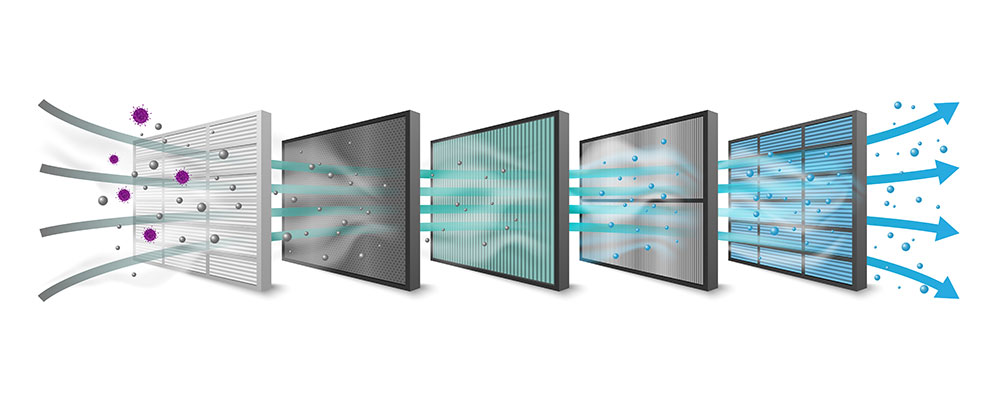
HEPA filters must be replaced periodically since they become clogged with captured particles over time. Most manufacturers recommend replacing them every 6-12 months depending on usage.
HEPA filtration is an effective way to improve indoor and outdoor air pollution quality by reducing exposure to harmful airborne particles.
What are the disadvantages of using a HEPA air purifier?
While HEPA air purifiers are effective at removing harmful particles from the air, they do have some potential downsides to consider. One of the main disadvantages is their cost. HEPA filters can be quite expensive, and replacing them regularly can add up over time.
Another issue is that HEPA filter-based air purifiers may not effectively remove certain volatile organic compounds (VOCs) or gasses from the air. These types of pollutants require specialized filters that go beyond what a basic HEPA filter can offer.

In addition, some people may find that using a HEPA air purifier results in increased noise levels in their homes. While many models are designed to operate quietly, others may produce noticeable sounds that could be bothersome for some individuals.
It’s important to note that while HEPA air purifiers are effective at capturing airborne particles like dust and pollen, they cannot address other sources of indoor air pollution such as mould or pet dander. It’s important to address all potential sources of indoor pollution when trying to improve your home’s air quality.
While there are some drawbacks associated with using a HEPA air purifier, these devices remain a valuable tool for improving indoor air quality and reducing exposure to harmful pollutants.
How to Choose the Right HEPA Air Purifier
Room size
Consider the size of the room where you plan to use the air purifier. Most models indicate the maximum room size they can effectively clean. Choose a purifier that can handle the square footage of your space.
Filter replacement
Check the manufacturer’s recommendations for filter replacement. Filters need to be replaced periodically to maintain their effectiveness, so consider the cost and availability of replacement filters.
Noise level
Air purifiers can generate noise while operating. Look for models with adjustable fan speeds or quiet operation features if noise is a concern.
Energy efficiency
Energy-efficient models can help you. Energy-efficient models can help you save on electricity costs without compromising performance. Look for air purifiers with ENERGY STAR certification or those that consume less power to operate.
Maintaining Your HEPA Air Purifier
Proper maintenance is crucial for ensuring the effectiveness and longevity of your HEPA air purifier. Regularly inspect the filters and replace them according to the manufacturer’s recommendations. Also, keep the air purifier clean by wiping the exterior with a damp cloth and vacuuming the vents as needed.
Conclusion
HEPA air purifiers can significantly improve indoor air quality by removing allergens, smoke particles, odours, and even viruses and bacteria. When choosing a HEPA air purifier, consider factors like room size, filter replacement, noise level, and energy efficiency. With proper maintenance, a HEPA air purifier can be an invaluable tool for creating a healthier and more comfortable indoor environment. Visit hokocare.com and discover the best air purifiers filter. As HOKO designed the best quality air purifiers for you.
FAQs
Can HEPA air purifiers remove VOCs?
While HEPA filters are not specifically designed to remove volatile organic compounds (VOCs), air purifiers with additional filters, such as activated carbon filters, can effectively reduce VOC levels in the air.
How often should I change the HEPA filter in my air purifier?
The frequency of filter replacement depends on the specific model and usage. Generally, HEPA filters should be replaced every 6 to 12 months. Always follow the manufacturer’s recommendations for filter replacement.
Can HEPA air purifiers help with pet allergies?
Yes, HEPA air purifiers can effectively remove pet dander and hair, which are common triggers for pet allergies. To maximize their effectiveness, consider placing the air purifier in rooms where your pets spend the most time.
Do HEPA air purifiers produce ozone?
No, true HEPA air purifiers do not produce ozone. Some air purifiers that use ozone-generating technologies may emit ozone, which can be harmful to your health. Always choose a HEPA air purifier that does not produce ozone.
Do I need a HEPA air purifier in every room?
While having an air purifier in every room may not be necessary, it can be beneficial to place them in high-traffic areas or rooms where allergens and pollutants are more prevalent, such as living rooms, bedrooms, and kitchens.
